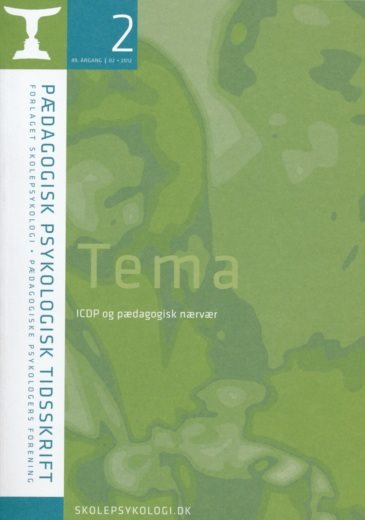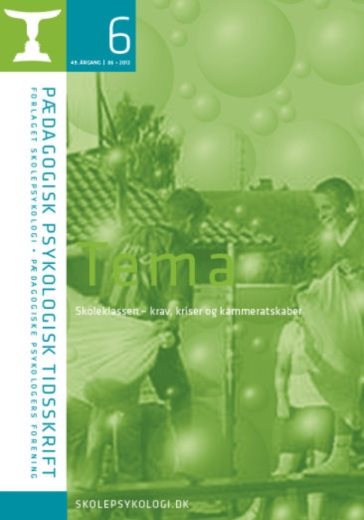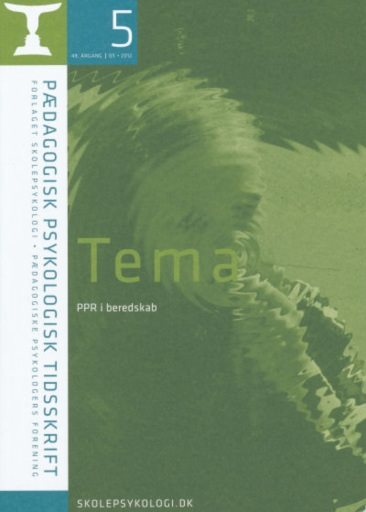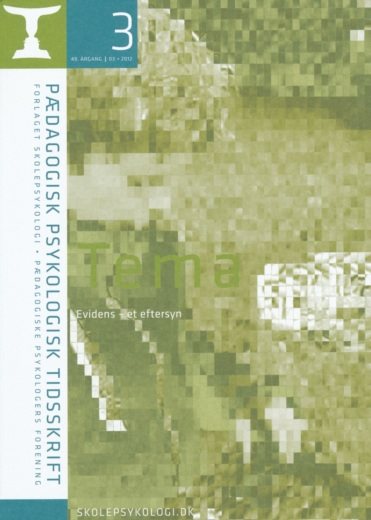Beskrivelse
Rønsholdt, Jørgen ( Psychologist, Skive).The Many Dimensions of Presence and the Importance of Competence. Pædagogisk psykologisk Tidsskrift, 2012, Vol.49, 2, 72 – 78.- An exercise called “Inner Quietness” is described, involving concentration, relaxation, and focusing on the process. The importance of developing competence in the field of presence is discussed. – Bjørn Glæsel.
Carlsen, Jesper ( Head master, Skive ). When ICDP Creates Meaningfulness – Leadership and ICDP. Pædagogisk Psykologisk Tidsskrift, 2012, Vol.49, 2, 79 -82.- The focus of ICDP (International Child Development Program, Oslo, 1992) is to create the best possible conditions for the development of a child. To obtain this it is necessary to create a common ground in the team of professionals that meet the child. The important role of the leader is discussed. – Bjørn Glæsel.
Godrim, Finn (Psychologist in Skive). Educational Psychologists as Developers of Competence in Relations and Contexts. Pædagogisk Psykologisk Tidsskrift, 2012, vol. 49, 2, 83 – 90. A discrepancy betw. the perceptions of teachers and school psychologists is described. Psychologists proclaim their willingness to work within a relational and contextual framework, but claim that this not wanted by the teachers. Teachers, however, often claim that this is exactly what they want. There is a great need of dialogue and further education of the psychologists. – Bjørn Glæsel.
Hundeide, Karsten (Professor, retired, Oslo ). ICDP and Human Nearness: Some Concepts Close to ICDP. Pædagogisk Psykologisk Tidsskrift, 2012, Vol.49, 2, 91 – 101. – The ICDP program has, intentionally, been created and presented as a simple program, easily adaptable and useful for teachers and advisers. In this article a number of related theories and approaches are presented: Desmond Tutu’s Ubuntu, Bråten’s conceptions of empathy, Stern’s motherhood constellation, Schaffer’s shared attention, Vygotsky’s zone of development as well as contributions by Klein, Bruner and Hoffman. It is concluded that child education must balance between proximity and comfort and on the other hand challenge and danger. It is commonly claimed that demands of responsibility, loyalty, discipline, and care is lacking in modern Western education. Is this the case? – Bjørn Glæsel
Jørgensen; Grethe, Bach & Groot, Annette (Leader of a day care institution & psychologist). From Project to Process. Pædagogisk Psykologisk Tidsskrift, 2012, Vol.49, 2, 102 – 110. – How can ICDP be implemented on the three necessary levels: the individual level, the collective level, and the organizational level. A two year project in a day care institution is described. Four important parameters emerged during the evaluation: development within appreciative relations – self reflection – development and learning within shared practice –structure and leadership. – Bjørn Glæsel.
Rye, Henning & Hundeide, Karsten ( Professor, retired, Oslo ). ICDP – A Resume of its Underlying Values and its Early History, Pædagogisk Psykologisk Tidsskrift, 2012, Vol.49, 2, 111 – 116. – The origin of ICDP was the liberation of Portugese colonies and the ensuing 1 mil. refugees migrating to Portugal. Several other projects contributed to the development: Marte Meo in Holland, MISC in Israel, and close cooperation with WHO. In 1995 the ministry of education in Norway decided that ICDP was to be implemented in Norway. After premature beginnings it gained momentum in 2007. Its fundamental values derive from Children’s Rights and on humanistic psychology. – Bjørn Glæsel.
Groot, Annette & Linder, Anne (Psychologists). LP and ICDP Suit Each Other. Pædagogisk Psykologisk Tidsskrift, 2012, Vol.49, 2, 117 – 124. – ICDP and LP are different approaches, not methods, and both are founded in research. LP prompts teachers to analyze the learning climate and to focus on factors that limit development. ICDP urges teachers to become aware of their own role in the quality of relationships. Both approaches assume that all systems are interdependent, and that children develop in the system and the relationships that are offered. LP and ICDP are not incompatible; they complement each other in the everyday life of teaching. – Bjørn Glæsel.





